
Computational Cognitive Science at New York University
Computational cognitive science studies the computational basis of learning, thought, and intelligence. New York University offers one of the top worldwide environments for training in this area. The purpose of this page is to give an overview of some of the resources available at NYU for prospective MA or Phd students. In addition, this page can be useful for NYU undergraduates interested in getting involved in research.
We often think of our intelligence as one factor that distinguishes us from other animals.
Humans write songs, build complex technologies, and communicate with language. However,
when we attempt to more specifically define what makes us unique in this sense we often
are forced to realize that there is intelligence in systems besides humans. Certainly animals
show certain types of intelligent behavior (e.g., simple problem solving, complex and adaptive
movements). In addition, we increasingly interact with artificial systems like our smartphone
or computer which display elements of intelligence as well (e.g., understanding spoken language,
planning out the best way to get home, etc...).
Computational cognitive science is the interdisciplinary study of intelligence that recognizes that intelligence is a property of many sufficiently complex systems. The key insight that unites this field of study is the idea that intelligence is best described in terms of computational systems (i.e., computer algorithms or programs). As a result, this field of study brings together many disparate fields interested in computation including computer science, data science, neuroscience, linguistics, psychology, and philosophy.
Some computational cognitive scientists emphasize the design of new intelligent computer systems (artificial intelligence) that may operate on principles different from the way biological intelligence works. Others work to understand how biological brains enable intelligence (e.g., how do our neurons support our ability to understand language?). Still others seek to understand the relationships between these different types of intelligence in a kind of "comparative psychology" (e.g., we have learned a lot about humans by studying animals, we can derive similar insights by comparing humans and artificial intelligence algorithms.)
Research in computational cognitive science thus lies at the intersection of technological engineering and the social sciences and humanities. Researchers in this area attempt to understand what makes us human by leveraging cutting edge developments in technology. Looking forward, computational cognitive science is likely to transform not only what we know about ourselves but also the kinds of future technologies that will inhabit our cities, homes, offices, pockets, and even bodies.
Example Research at NYU:
Psychology/Center for Data Science
[website]
I build computational models of everyday cognitive abilities, focusing on problems that are easier for people than they are for machines.
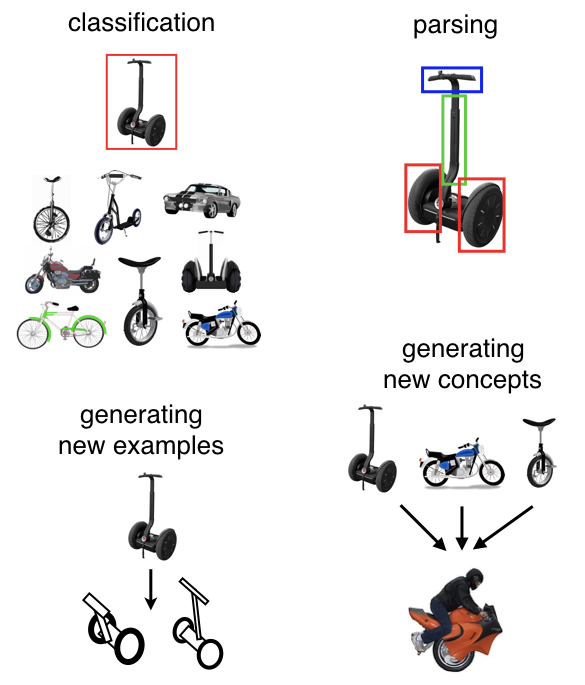
People can learn a new concept from just one or a handful of examples, whereas standard AI algorithms require a lot more data. A single example of a new visual concept (red box) can be enough information for a person to grasp the boundaries of the concept and generalize in a rich variety of ways (e.g., classification, generation, parsing). We are developing new computational models to capture these remarkable human learning abilities, combining the strengths of Bayesian program learning and deep generative neural networks.
Psychology
[website]
I am interested in self-teaching intelligent systems and applications of cognitive science to education.
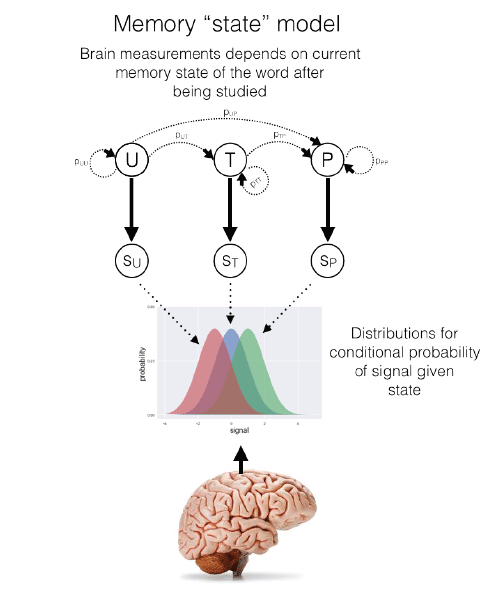
In the OMNI project (funded by NSF) we have been trying to develop Bayesian models that can decode the mnemonic status of individual items in memory using fMRI (i.e.,predict what you do or do not know without asking you). We then attempt to use that information to devise optimal ways to improve people’s memory using the models.
Linguistics/Center for Data Science
[website]
I study artificial neural network models for natural language understanding.
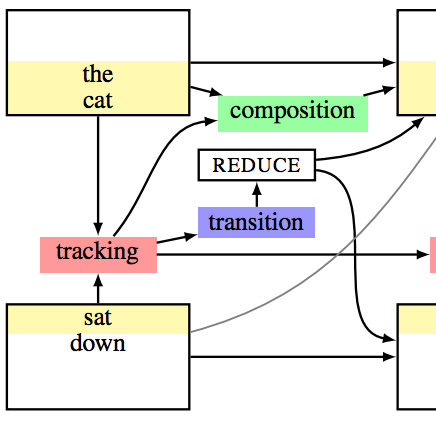
In the project Latent Structure Learning for Natural Language (funded by Samsung), we are developing methods to train a parser to produce hierarchical structures for sentences that optimally support sentence understanding, rather than training it to reproduce expert-annotated treebank data.
Psychology/Center for Neural Science
[website]
I am interested in human decision-making under uncertainty, in particular in deviations from optimality.
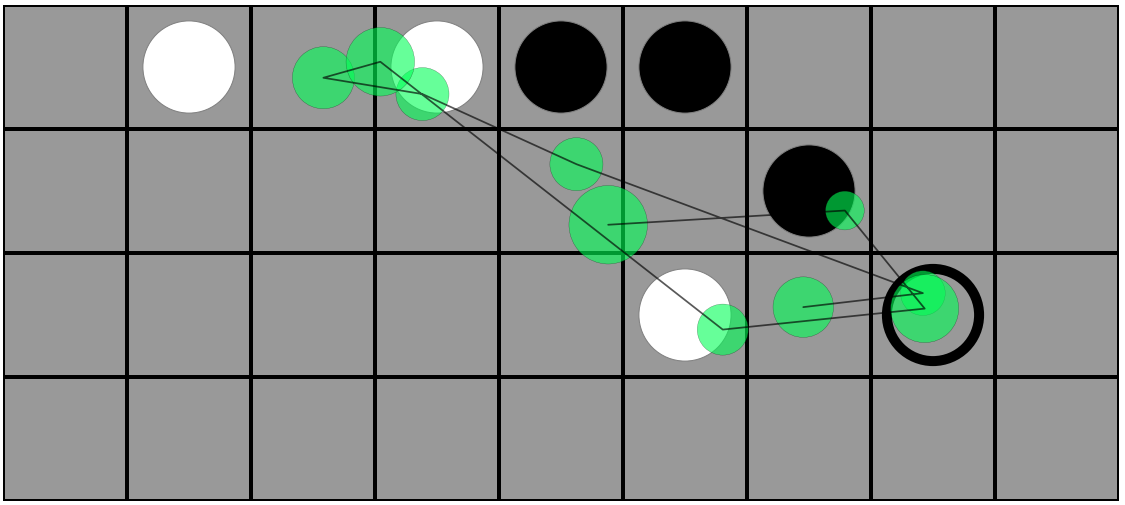
Planning sequences of actions is an important cognitive function, but is complicated by the vast number of possibilities in the decision tree. We use a simple tic-tac-toe-like game combined with AI-inspired computational models to investigate how humans meet this challenge. Fig. shows example board position in the experimental game, with overlaid the eye trajectory of the player with the black pieces. A larger circle means a longer fixation. The open circle indicates the player's eventual move.
Psychology
[website]
I am interested in causal reasoning and learning and the use of causal graphics models (a.k.a., Bayesian networks) as a candidate theory of people’s abilities in these areas.
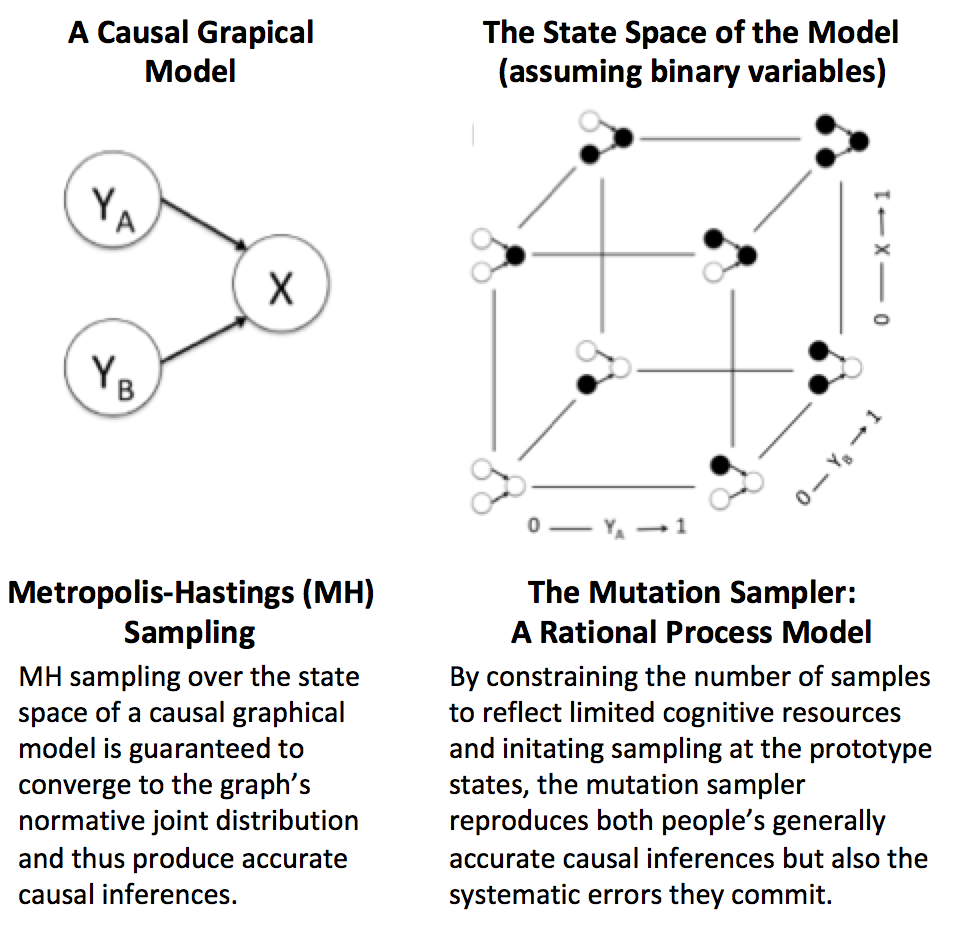
Using computational sampling methods such as MCMC, my lab has developed a model named the mutation sampler, a rational process model of human causal reasoning that explains both the general veridicality of people’s causal inferences and the systematic errors they make.
Key NYU Faculty:
Cognitive science is a highly interdisciplinary field and faculty research which touches on these topics is spread across multiple university departments and units. Here is a convenient listing of a few researchers working in this area along with a brief description of their research interests:
- Ned Block (Philosophy) - foundations of neuroscience and cognitive science, relationship between perception and cognition
- Sam Bowman (Linguistics/Center for Data Science) - natural language processing, deep learning
- David Chalmers (Philosophy) - philosophy of mind (especially consciousness), foundations of cognitive science, philosophy of language
- Kyunghyun Cho (Computer Science/Center for Data Science) - machine learning, natural language processing, deep learning (also research scientist at Facebook AI in NYC)
- Ernest Davis (Computer Science) - commonsense understanding in human and artificial intelligence, physical reasoning
- Moira Dillon (Psychology) - cognitive development, spatial cognition, simulation vs. rule-based reasoning, human and artificial intelligence
- Rob Fergus (Computer Science) - machine learning and computer vision (also research scientist at Facebook AI in NYC)
- Todd Gureckis (Psychology) - active/self-directed learning, categorization, decision making, computational cognitive neuroscience, intersection of human/machine learning, crowdsourcing research
- Catherine Hartley (Psychology) - computational models of decision making and learning, developmental cognitive neuroscience
- David Heeger (Psychology/Center for Neural Science) - computational models of attention, perception, working memory, navigation, motor control
- Brenden Lake (Psychology/Center for Data Science) - computational cognitive modeling, human and machine learning, concept learning
- Tal Linzen (Linguistics/Center for Data Science) - computational models of human language acquisition and processing; evaluating and improving linguistic generalization in artificial intelligence systems
- Yann LeCun (Computer Science/Center for Data Science) - machine learning, computer vision, Director of AI research at Facebook in NYC
- Zhong-Lin Lu (Center for Neural Science/Psychology, Chief Scientist and Associate Provost for Sciences, NYU Shanghai) - computational brain models for perception and cognition, computational and psychophysics studies of perception, attention, perceptual learning, applications of hierarchical Bayesian models in adaptive testing, psychophysics, and brain networks
- Weiji Ma (Psychology/Center for Neural Science)- computational neuroscience, working memory, decision making, perception, higher cognition, fMRI
- Gary Marcus (Emeritus, Psychology) - cognitive scientist, AI entrepreneur
- Liina Pylkkänen (Linguistics/Psychology) - neural bases of language, particularly syntatic and semantic processing
- Bob Rehder (Psychology) - causal learning, categorization, reasoning
- Christina Savin (Center for Neural Science/Center for Data Science) - using tools from machine learning to figure out how learning and memory happen at the level of neural circuits
- Eero Simoncelli (Center for Neural Science/Center for Data Science)- computer vision, computational approach to visual neuroscience
What resources make NYU a particularly great place to study computational cognitive science?
NYU is a leading university for studying cognitive psychology, machine learning, AI, and neuroscience. Computational cognitive science sits at the interface of these fields, creating an extraordinary community for training in this area. The following groups and resources at NYU are reflective of this interdisciplinary synergy:
- Center for Data Science - Leading center devoted to interdisciplinary study of data science
- Training Program in Computational Neuroscience - NIH funded undergrad/pre/post-doc training grant on computational neuroscience (PI: XJ Wang and Weiji Ma)
- Concepts and Categories research group (ConCats) - weekly seminar devoted to concepts, categories, and general cognitive science issues
- Computer Science department (with extensive expertise in machine learning, natural language processing, and computational biology)
- Computational Intelligence, Learning, Vision, and Robotics (CILVR) research group - AI research group at NYU
- Center for Mind, Brain, and Consciousness - devoted to foundational philosophical issues in mind-brain sciences (led by Ned Block and David Chalmers)
- The Human Project - a groundbreaking large scale research study on the lives of New York City residents
- NYU-ECNU Institute of Brain and Cognitive Science at NYU Shanghai - International research institute devoted to understand the mechanisms by which neural circuits in the brain generate higher cognition
- Center for Brain Imaging - provides support for a research fMRI facility as well other methods for noninvasive study of the human brain
What are some of the course offerings relevant at NYU?
There are a wide variety of courses at NYU which offer training in computational methods, behavioral science, big data analytics, neuroscience techniques and philosophy. However there are a couple of courses in particular that give a sense of the opportunities:
- Advancing AI through Cognitive Science (Lake, grad)
- Robots, Minds, and Brains (Gureckis, undergrad)
- Collecting behavioral data online (Gureckis, grad)
- Computational Cognitive Science (Gureckis & Lake, grad)
- Bayesian Modeling of Behavior (Ma, grad)
- Artificial Intelligence (Davis, grad)
- Artificial Intelligence (David, undergrad)
- Deep Learning (Lecun, grad)
- Machine Learning and Statistics (Rosenberg, grad)
- Natural Language Understanding with Distributed Representations (Cho, grad)
- Natural Language Understanding and Computational Semantics (Bowman, grad)
Course offerings at nearby universities
Students at NYU are also often able to enroll in classes at Columbia University where faculty such as David Blei and Andrew Gelman teach courses on advanced statistical methods and computational modeling.
Here is a list of faculty and courses taught at other universities in the New York area which are often open to students at NYU
- Computational Models of Learning and Development (Bonawitz, grad, Rutgers Newark)
If you are interesting in studying these topics at NYU here are the answers to some frequently asked questions.
I am an undergraduate at NYU, how to do I get involved in this research?
Most of the faculty listed above involve undergraduates in their research. One approach is to reach out to a professor working in an area that interests you via email. There may be paid or unpaid research projects you can help with even early in your undergraduate career. In fact, starting to get involved in undergraduate research early (e.g., sophomore year) can help you build the knowledge and skills to later apply to graduate school.
It is also useful to think about what types of classes to take as an undergraduate which will help build your knowledge and skills. You might consider talking with a professor about the types of courses they recommend. At minimum, students working this area will benefit from experience with computer programming classes, as well as fundamental mathematical courses such as linear algebra, combinatorics, and signal processing.
How do I apply to NYU's graduate school to study this topic?
While there is no "cognitive science" graduate program at NYU, interested candidates can apply through the following programs: Ph.D. Program in Cognition and Perception (deadline is Dec. 1, 2017), the Ph.D. program in Data Science (deadline is Dec. 18, 2017), or the Ph.D. program in neural science (deadline is Dec. 1, 2017). University policy dictates that you may only apply to one program at a time, and we suggest that you choose carefully! If you have question you might reach out to a faculty member most related to your interests and get their advice.
What is the NYU graduate funding situation like?
It depends a bit on the program that you apply to. Detailed questions about this should be referred to the individual program you apply to (see the links above). At the present time, students accepted through the Center for Data Science, the Center for Neural Science, or Psychology are usually offered five years of guaranteed support including a stipend and tuition costs (see here for the details from GSAS). In addition, first year students are usually offered subsidized student housing in Manhattan close to the university.